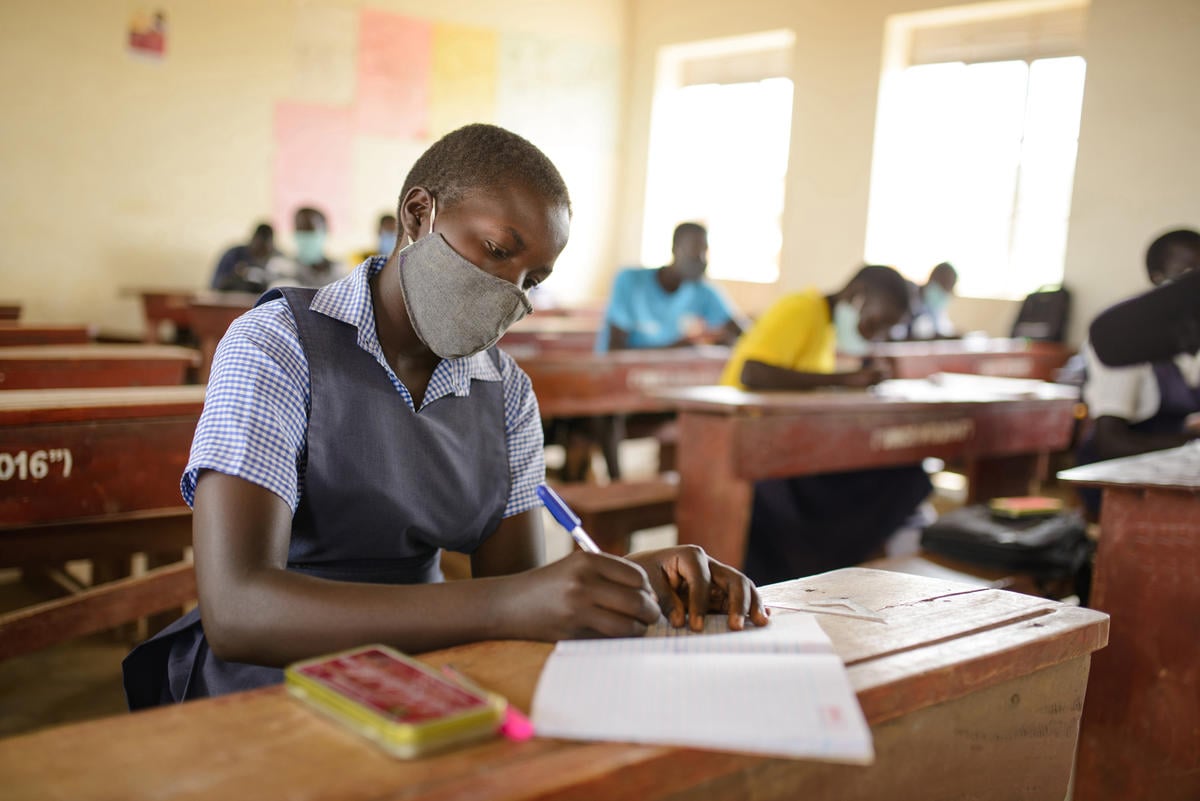Limited access to learning places refugee girls' education at risk

Limited access to learning places refugee girls' education at risk
Alice, 17, wanders around the paths in Inke refugee camp for hours, hawking groundnuts and other items. The young mother hopes to make some money for herself and her three-month-old son, Pascal.
Conflict in the Central African Republic forced her and her family members to flee in 2013, finding refuge in Inke camp, some 45 kilometres from Gbadolite town in the Democratic Republic of Congo, DRC’s Nord-Ubangi province. Over 172,000 Central African refugees are currently in the Congo.
Eager to resume school, Alice’s hopes were scuttled when she fell pregnant.
“When I got pregnant, he ran away from the camp, never to be seen again,” she says of her 19-year-old boyfriend.
Shortly after, Alice had to drop out of primary school. She was in Grade Five.
Her situation is not unusual; many young girls are at risk of missing out on their education due to factors that often result in early pregnancy.
“When I got pregnant, he ran away from the camp, never to be seen again.”
“In June, there were three girls between the ages of 12 and 16 who were pregnant,” says Central African refugee Nicole Ngbowali who is the President of Inke camp Women’s Committee. Nicole chairs the decision-making body which gives refugee women a platform to voice their concerns.
Nicole, who’s also a teacher at the only primary school in the area, adds that the situation is further compounded by several other factors. While the Government has scrapped payment of tuition fees for primary education, the law is yet to be implemented and so, most refugees and Congolese students continue to pay fees, although the majority of them cannot afford it.
“Because parents can’t afford the fees, there is a drastic drop in secondary school enrollment,” adds Nicole.
Inke camp hosts over 18,000 refugees, of whom nearly 11,000 are children and about 50 per cent are girls. The only primary school here caters for just over 2,500 students, over half of whom are girls. While about 70 per cent of school-going children have enrolled for primary school, the figure is disturbingly low at 15 per cent for secondary education.
“These issues lead up to the causes of early pregnancies among girls...idleness increases their vulnerability.”
School facilities are poorly equipped as they lack adequate water and sanitation facilities, qualified teachers, school materials and furniture. Overall, refugees and Congolese students have limited access to secondary and university education as well as to vocational training opportunities.

“All these issues lead up to the causes of early pregnancies among girls,” adds Nicole. “Idleness increases their vulnerability.”
Being idle also means that girls and boys are exposed to a variety of protection risks, including abuse, violence, sexual exploitation or possible recruitement by armed groups.
“Girls want to look decent and they have needs but have no money. This exposes them to great risks and they can end up being sexually abused or assaulted,” explains Nicole.
She adds that girls sometimes feel compelled to resort to dangerous and desperate coping mechanisms such as survival sex, tomeet their basic needs. This often leaves them vulnerable to health, physical and emotional risks such as sexually transmitted infections (STIs), unintended pregnancies and unsafe abortions and the increased risk of rape and physical violence.
UNHCR, the UN Refugee Agency and partner agencies like AIDES and ADSSE have taken steps to mitigate all these elements.
“We conduct regular awareness campaigns on the dangers of sexual and gender-based violence in and out of the camps,” says Laurianne Furaha, UNHCR’s Protection Officer based in Gbadolite.
Laurianne adds that the International Olympics Committee’s ‘Sports for Protection’ project has introduced volleyball, basketball and traditional martial arts like capoeira and sawara in the camp to keep the youth busy.
Additional initiatives like dressmaking, soap-making, vegetable oil refinery and blacksmith workshops target adults.
UNHCR has partnered with the Vodafone Foundation to establish media centres for education in the camp, where children and the youth can access digital literacy programmes, exam preparation platforms, Microsoft Office programs and the internet.
“These self-reliance activities are vital to prevent young girls like Alice from early motherhood.”
But with only 50 tablets available to go around the entire camp and host community, access is limited. There is also just one sewing machine available for dressmaking trainees – a situation that demotivates them.
“The youth have too much time on their hands with too little else to do,” cautions Nicole, adding that while these initiatives are vitally helpful, more needs to be done.
“These self-reliance activities are vital to prevent young girls like Alice from early motherhood,” she adds.
Alice is hoping to resume her education journey and later acquire the life skills she needs.
“I need to be back in school,” she says. “I also want to learn tailoring so I can support my son.”









